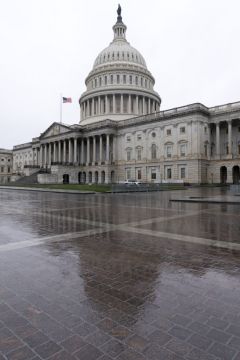President Donald Trump’s extraordinary challenge of his election defeat by President-elect Joe Biden is becoming a defining moment for the Republican Party before next week’s joint session of Congress to confirm the Electoral College results.
Senate Majority Leader Mitch McConnell is urging Republicans not to try to overturn the election, but not everyone is heeding him.
Senator Josh Hawley of Missouri has vowed to join House Republicans in objecting to the state tallies. On the other side of the party’s split, fellow GOP senator Ben Sasse of Nebraska warns such challenges are a “dangerous ploy” threatening the nation’s civic norms.
Caught in the middle is vice president Mike Pence, who faces growing pressure from Mr Trump’s allies over his ceremonial role in presiding over the session Wednesday. This has included a lawsuit – aimed to give Mr Pence the power to overturn the results of the presidential election – that was dismissed by a federal judge on Friday.

The days ahead are expected to do little to change the outcome.
Mr Biden is set to be inaugurated on January 20 after winning the Electoral College vote 306-232. But the effort to subvert the will of voters is forcing Republicans to make choices that will set the contours of the post-Trump era and an evolving GOP.
“I will not be participating in a project to overturn the election,” Mr Sasse wrote in a lengthy social media post.
Why I Will Not Participate in a Project to Overturn the Election: https://t.co/z8niiPle3q
— Senator Ben Sasse (@SenSasse) December 31, 2020
Mr Sasse, a potential 2024 presidential contender, said he was “urging my colleagues also to reject this dangerous ploy”.
Mr Trump, the first president to lose a re-election bid in almost 30 years, has attributed his defeat to widespread voter fraud, despite the consensus of non-partisan election officials that there was none.
Of the roughly 50 lawsuits the president and his allies have filed challenging election results, nearly all have been dismissed or dropped. He has also lost twice at the US Supreme Court.
Still, the president has pushed Republican senators to pursue his unfounded charges even though the Electoral College has already cemented Mr Biden’s victory, and all that is left is Congress’s formal recognition of the count before the new president is sworn in.
“We are letting people vote their conscience,” senator John Thune, the second-ranking Republican, told reporters at the Capitol.
Mr Thune’s remarks as the GOP whip in charge of rounding up votes show Republican leadership is not putting its muscle behind Mr Trump’s demands, but allowing senators to choose their course. He noted the gravity of questioning the election outcome.

“This is an issue that’s incredibly consequential, incredibly rare historically and very precedent-setting,” he said. “This is a big vote. They are thinking about it.”
Mr Pence will be carefully watched as he presides over what is typically a routine vote count in Congress but is now heading toward a prolonged showdown that could extend into Wednesday night, depending on how many challenges Mr Hawley and others mount.
A federal judge on Friday dismissed a last-gasp lawsuit led by a House Republican aimed at giving Mr Pence the power to overturn the results of the election won by Mr Biden when Congress formally counts the Electoral College votes next week.
Mr Pence, as president of the Senate, will oversee the session on Wednesday and declare the winner of the White House race. The Electoral College this month cemented Mr Biden’s 306-232 victory.
The suit named Mr Pence, who has a largely ceremonial role in next week’s proceedings, as the defendant, and asked the court to throw out the 1887 law that spells out how Congress handles the vote counting.
It asserted the vice president “may exercise the exclusive authority and sole discretion in determining which electoral votes to count for a given State”.
In dismissing the lawsuit filed by Texan Republican representative Louie Gohmert and a group of Republican electors from Arizona, Texas US District Judge Jeremy Kernodle, a Trump appointee, wrote that the plaintiffs “allege an injury that is not fairly traceable” to Mr Pence, “and is unlikely to be redressed by the requested relief”.







